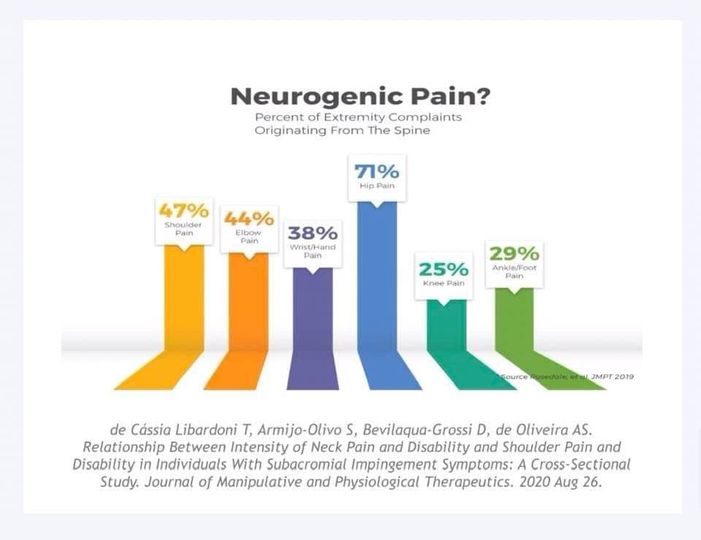I recently had a podiatrist send me a patient. The podiatrist told the patient their foot pain was coming from their spine rather than their feet. I was impressed that the podiatrist understood the connection between pain in the feet and the spine. He had correctly determined that the patient’s pain was neurogenic or neuropathic, due to either dysfunction or damage of the nervous system as it passes through the spine, rather than trauma, dysfunction, or disease of the of the muscles, ligaments, joints or bones of the feet.
Sciatica, leg pain, from a pinched nerve in the low back due to a herniated disc is a neuropathy that we commonly treat. Neuropathic pain can be experienced as:
- Spontaneous pain (pain that comes without stimulation):
- Shooting, burning, stabbing, or an electric shock-like pain;
- Tingling, numbness, weakness, or a “pins and needles” feeling.
Untreated it can progress through 5 stages:
- Occasional numbness and pain,
- More regular symptoms,
- The pain reaches its high point,
- Constant numbness, and
- A total loss of feeling.
The neuropathic symptoms of may improve or be cured if the underlying condition causing the neuropathy is cured or better managed. The real key to resolving neuropathic pain is addressing its cause in the early stages, before it becomes more constant or increases in intensity.
While as many as 10 percent of Americans experience some form of neuropathic pain is not normal. The experience of pain means that something is wrong and the pain should not be ignored. Neuropathic pain experienced in the extremities commonly originates in the spine. There is a:
- 47% chance that shoulder pain originates in the spine rather than the shoulder,
- 44% chance that elbow pain originates in the spine rather than the elbow,
- 38% chance that wrist/hand pain originates in spine rather than the hand or wrist,
- 71% chance that hip pain originates in the spine rather than the hip,
- 25% chance knee pain originates in the spine rather than the knee and a
- 29% chance that ankle/foot pain originates in the spine rather than the foot or ankle.

If extremity pain does not resolve with exercise or therapies applied directly to the extremity there is a high probability you are dealing with neurogenic pain. Addressing the cause of the pain, the spine, during the early stages of of the condition with chiropractic care, decompression traction and regular exercise are three keys to resolving extremity neuropathic pain. Delaying treatment could lead to chronic pain and a total loss of feeling, leaving the patient with no option other than drugs, surgery or trying to live with severe chronic pain. Over time, neuropathic pain can lead to serious disability and complications, including depression, problems sleeping, anxiety, and more. We have a good track record for treating spine related neuropathic pain in the extremities. Give us a call and make an appointment.





Neuropathic pain: when something gets on your nerve
June 29, 2022 by manager • Uncategorized
I recently had a podiatrist send me a patient. The podiatrist told the patient their foot pain was coming from their spine rather than their feet. I was impressed that the podiatrist understood the connection between pain in the feet and the spine. He had correctly determined that the patient’s pain was neurogenic or neuropathic, due to either dysfunction or damage of the nervous system as it passes through the spine, rather than trauma, dysfunction, or disease of the of the muscles, ligaments, joints or bones of the feet.
Sciatica, leg pain, from a pinched nerve in the low back due to a herniated disc is a neuropathy that we commonly treat. Neuropathic pain can be experienced as:
Untreated it can progress through 5 stages:
The neuropathic symptoms of may improve or be cured if the underlying condition causing the neuropathy is cured or better managed. The real key to resolving neuropathic pain is addressing its cause in the early stages, before it becomes more constant or increases in intensity.
While as many as 10 percent of Americans experience some form of neuropathic pain is not normal. The experience of pain means that something is wrong and the pain should not be ignored. Neuropathic pain experienced in the extremities commonly originates in the spine. There is a:
If extremity pain does not resolve with exercise or therapies applied directly to the extremity there is a high probability you are dealing with neurogenic pain. Addressing the cause of the pain, the spine, during the early stages of of the condition with chiropractic care, decompression traction and regular exercise are three keys to resolving extremity neuropathic pain. Delaying treatment could lead to chronic pain and a total loss of feeling, leaving the patient with no option other than drugs, surgery or trying to live with severe chronic pain. Over time, neuropathic pain can lead to serious disability and complications, including depression, problems sleeping, anxiety, and more. We have a good track record for treating spine related neuropathic pain in the extremities. Give us a call and make an appointment.